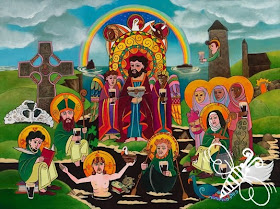 |
| "St Brigid's Lake of Beer," Michael O'Neill McGrath* |
I should like a great lake of beer for the King of
Kings.
I should like the angels of Heaven to be drinking it through time eternal.
I should like excellent meats of belief and pure piety.
I should like the men of Heaven at my house.
I should like barrels of peace at their disposal.
I should like for them cellars of mercy.
I should like cheerfulness to be their drinking.
I should like Jesus to be there among them.
I should like the three Marys of illustrious renown to be with us.
I should like the people of Heaven, the poor, to be gathered around from all parts.
I should like the angels of Heaven to be drinking it through time eternal.
I should like excellent meats of belief and pure piety.
I should like the men of Heaven at my house.
I should like barrels of peace at their disposal.
I should like for them cellars of mercy.
I should like cheerfulness to be their drinking.
I should like Jesus to be there among them.
I should like the three Marys of illustrious renown to be with us.
I should like the people of Heaven, the poor, to be gathered around from all parts.
excerpt from
St Brigid and the Bathwater
by Martyn Cornell
...While I was putting together the order of service, I even found a suitably beery quote fromThe Life of St Brigid the Virgin, written by a Kildare monk, Cogitosus Ua hAedha, around AD650, to use as one of the readings:
On another extraordinary occasion, this venerable Brigid was asked by some lepers for beer, but had none. She noticed water that had been prepared for baths. She blessed it, in the goodness of her abiding faith, and transformed it into the best beer, which she drew copiously for the thirsty. It was indeed He Who turned water into wine in Cana of Galilee Who turned water into beer here, through this most blessed woman’s faith.
Cogitosus, of course, was keen to chalk the bathwater-into-beer event up as a miracle, just like the one at the wedding at Cana, but there is, in fact, a possible non-miraculous explanation for how St Brigid was able to make the thirsty lepers happy. A record of a fire at the monastry of Clonard in Ireland around AD787 speaks of grain stored in ballenio, literally “in a bath”, which seems to mean the grain being soaked as part of the initial processes of malting. What St Brigid drew off, I’d suggest, may have been water from the ballenium where the grain was steeping in the first stage of malt-making.
Quite possibly, if the grain had begun to sprout wild yeasts had already started multiplying in the water, and making alcohol. Cogitosus heard the story, already more than a century old, about Brigid giving the lepers water from the ballenium to drink and, presumably because he knew nothing about brewing, thought this ballenium was an ordinary bath for washing in. While water from the grain steep might have made a passable ale substitute if you were a thirsty leper, for “bath water” to taste like ale must have seemed a miracle to the confused Cogitosus.
Ale was an important part of Irish society: the Crith-Gablach, an Irish law book compiled about the middle or end of the 7th century AD, declared that the “seven occupations in the law of a king” were:
Sunday, at ale drinking, for he is not a lawful flaith [lord] who does not distribute ale every Sunday; Monday, at legislation, for the government of the tribe; Tuesday, at fidchell [a popular Iron Age board game]; Wednesday, seeing greyhounds coursing; Thursday, at the pleasures of love; Friday, at horse-racing; Saturday, at judgment.”
Who’d be an Irish king, eh?
For the full article, including an old Irish poem on the best ales of the country, go to Martyn Cornell's Zythophile: Beer Now and Then. Click here for his article "Ancient Irish Ales". Martyn is the author of Amber Gold and Black: The History of Britain's Great Beers.* "St. Brigid's Lake of Beer" by Bro. Mickey (Michael O'Neill McGrath) an Oblate of St. Francis de Sales.

No comments:
Post a Comment